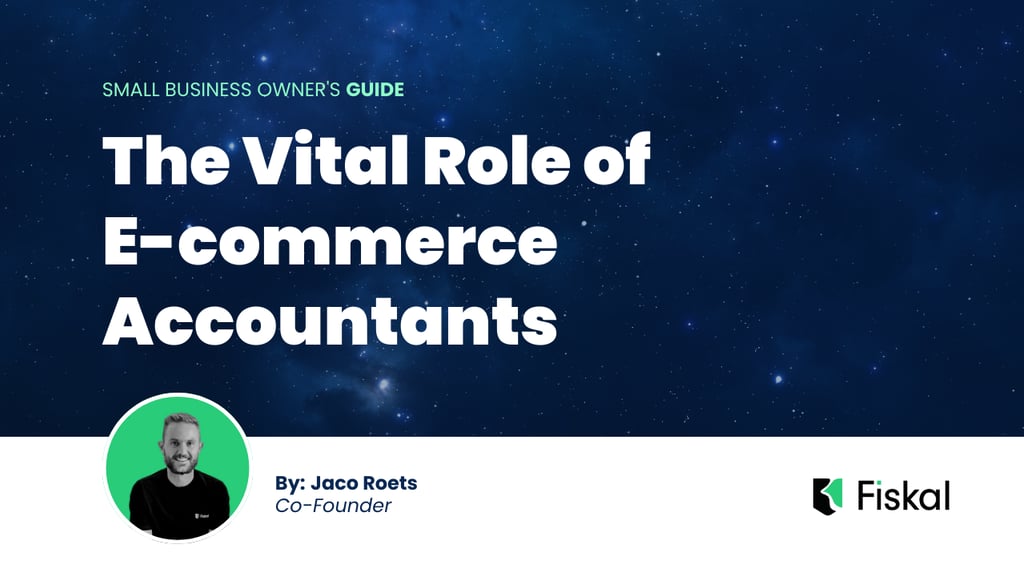From Transactions to Taxation: The Vital Role of E-commerce Accountants
Discover why your e-commerce business needs the expertise of a dedicated accountant. Learn how these professionals can optimize your finances, maximize profitability and ensure compliance, leading your venture to greater success.
SYSTEMS AND SOFTWARE


In today's digital age, e-commerce has emerged as a dominant force in retail. The convenience and accessibility it offers have attracted businesses of all sizes to establish an online presence. However, amidst the opportunities, e-commerce ventures face unique financial challenges. Managing transactions, tracking inventory, navigating tax regulations, and optimizing profitability require specialized knowledge and skills. This is where an expert e-commerce accountant becomes indispensable.
Understanding the E-commerce Landscape
Before delving into the crucial role of e-commerce accountants, let's take a closer look at the dynamics of online retail. E-commerce transactions involve a multitude of financial activities, including sales revenue, expenses, inventory management, payment processing and taxation. These transactions can be complex and voluminous, especially for growing businesses. Without proper oversight and management, financial discrepancies and compliance issues can arise, potentially jeopardizing the business's sustainability and growth.
The Expertise of E-commerce Accountants
E-commerce accountants are professionals trained to handle the intricacies of online retail finances. They possess a unique skill set that combines accounting principles with an in-depth understanding of e-commerce platforms, payment gateways and digital marketing channels. Their primary objective is to ensure the financial health and compliance of e-commerce businesses while maximizing profitability.
1. Transaction Management:
E-commerce accountants oversee all financial transactions conducted through online platforms. They monitor sales revenue, track expenses, reconcile discrepancies and maintain accurate financial records. By implementing robust accounting systems and procedures, they streamline transaction processes and minimize the risk of errors or fraud.
2. Inventory Control:
Effective inventory management is critical for e-commerce businesses to optimize stock levels, prevent stockouts and avoid overstocking. E-commerce accountants utilize advanced inventory tracking systems to monitor product movements, analyze sales trends and forecast demand. This proactive approach helps businesses maintain optimal inventory levels, reduce carrying costs and improve cash flow.
3. Tax Compliance:
Navigating tax regulations is a complex undertaking for e-commerce businesses, especially those operating across multiple jurisdictions. E-commerce accountants stay abreast of ever-changing tax laws and regulations to ensure compliance at all levels—federal, state and international. They help businesses identify eligible deductions, manage sales tax obligations and prepare accurate tax returns, minimizing the risk of penalties or audits.
4. Financial Analysis and Reporting:
E-commerce accountants provide valuable insights through financial analysis and reporting. They analyze key performance indicators (KPIs), such as gross margin, conversion rate and customer acquisition cost, to assess the business's financial health and identify areas for improvement. By generating comprehensive financial reports and dashboards, they empower business owners to make informed decisions and drive growth strategies.
5. Business Strategy and Advisory:
Beyond traditional accounting tasks, e-commerce accountants serve as strategic advisors to business owners. They leverage their financial expertise to develop growth strategies, optimize pricing strategies and identify expansion opportunities. By offering personalized advice and recommendations, they help e-commerce businesses achieve their long-term objectives and stay competitive in the dynamic marketplace.
The Benefits of Hiring an E-commerce Accountant
The value proposition of hiring an e-commerce accountant extends far beyond number crunching and compliance. Here are some compelling reasons why e-commerce businesses should consider enlisting the services of a dedicated accountant:
Expertise and Specialization: E-commerce accountants possess specialized knowledge and experience in managing online retail finances, making them well-equipped to handle the unique challenges of the digital marketplace.
Time and Resource Savings: Outsourcing accounting tasks to professionals frees up valuable time and resources that can be redirected towards core business activities, such as product development, marketing and customer service.
Risk Mitigation: By ensuring compliance with tax regulations and financial reporting standards, e-commerce accountants help mitigate the risk of costly fines, penalties or legal disputes.
Strategic Guidance: E-commerce accountants offer strategic guidance and insights that can drive business growth, improve profitability and enhance overall performance.
Scalability: As e-commerce businesses grow and evolve, e-commerce accountants provide scalable solutions and support to accommodate changing needs and complexities.
Conclusion
In the competitive landscape of e-commerce, sound financial management is essential for sustained success. E-commerce accountants play a pivotal role in optimizing finances, ensuring compliance and driving strategic growth initiatives. By leveraging their expertise and specialized skill set, e-commerce businesses can navigate the complexities of online retail with confidence and achieve their full potential. If you're ready to take your e-commerce venture to the next level, consider partnering with a trusted e-commerce accountant to unlock new opportunities and maximize profitability.












